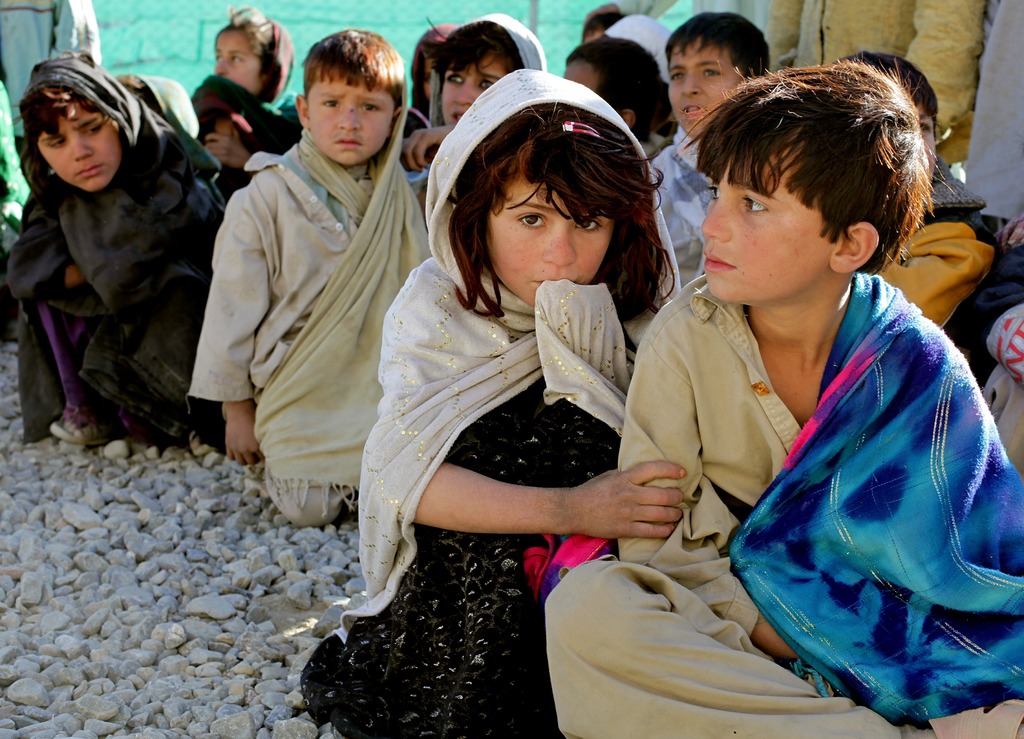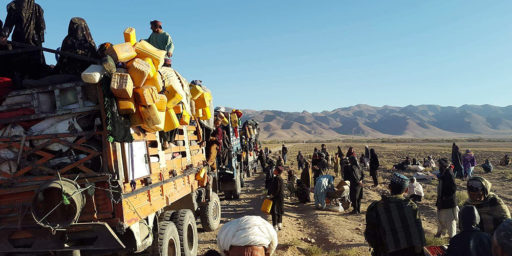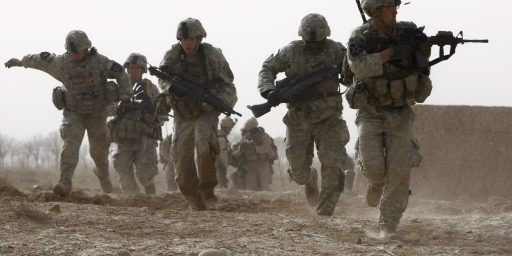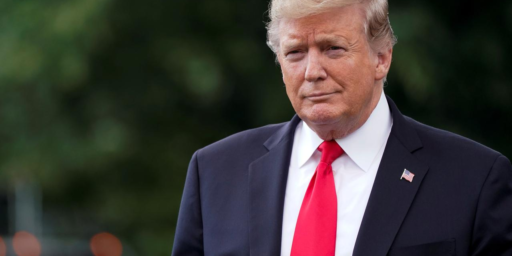US Sanctions Compounding Afghan Crisis
Children are starving and it's partly our fault.

Christina Goldbaum, reporting for the NYT (“Facing Economic Collapse, Afghanistan Is Gripped by Starvation“):
Nearly four months since the Taliban seized power, Afghanistan is on the brink of a mass starvation that aid groups say threatens to kill a million children this winter — a toll that would dwarf the total number of Afghan civilians estimated to have been killed as a direct result of the war over the past 20 years.
While Afghanistan has suffered from malnutrition for decades, the country’s hunger crisis has drastically worsened in recent months. This winter, an estimated 22.8 million people — more than half the population — are expected to face potentially life-threatening levels of food insecurity, according to an analysis by the United Nations World Food Program and Food and Agriculture Organization. Of those, 8.7 million people are nearing famine — the worst stage of a food crisis.
Such widespread hunger is the most devastating sign of the economic crash that has crippled Afghanistan since the Taliban seized power. Practically overnight, billions of dollars in foreign aid that propped up the previous Western-backed government vanished and U.S. sanctions on the Taliban isolated the country from the global financial system, paralyzing Afghan banks and impeding relief work by humanitarian organizations.
[…]
Compounding its economic woes, the country is confronting one of the worst droughts in decades, which has withered fields, starved farm animals and dried irrigation channels. Afghanistan’s wheat harvest is expected to be as much as 25 percent below average this year, according to the United Nations. In rural areas — where roughly 70 percent of the population lives — many farmers have given up cultivating their land.
That things would get much worse for the Afghan people once the Taliban returned to power and Western (mostly American) money dried up was inevitable. We obviously weren’t going to continue sending billions of dollars a year to the new regime. But our sanctions policy is compounding a humanitarian crisis.
Since the Taliban seized power, the United States and other Western donors have grappled with delicate questions over how to avert a humanitarian catastrophe in Afghanistan without granting the new regime legitimacy by removing sanctions or putting money directly into the Taliban’s hands.
“We believe that it’s essential that we maintain our sanctions against the Taliban but at the same time find ways for legitimate humanitarian assistance to get to the Afghan people. That’s exactly what we’re doing,” the deputy U.S. Treasury secretary, Wally Adeyemo, told the Senate Banking Committee in October.
But as the humanitarian situation has worsened, aid organizations have called on the United States to move more quickly.
American officials showed some flexibility around loosening the economic chokehold on Afghanistan last week, when the World Bank’s board — which includes the United States — moved to free up $280 million in frozen donor funding for the World Food Program and UNICEF. Still, the sum is just a portion of the $1.5 billion frozen by the World Bank amid pressure from the United States Treasury after the Taliban took control.
How those released funds will be transferred into Afghanistan remains unclear. Despite letters that the U.S. Treasury Department recently issued to foreign banks assuring them they can process humanitarian transactions to Afghanistan, many financial institutions remain fearful of exposure to U.S. sanctions.
Again, not putting money directly into the hands of the Taliban is understandable. The obvious compromise would be to let trusted organizations—the Red Crescent and UNICEF come immediately to mind—administer the aid, handing out food and medicine directly to families.





Did Pakistan relocated? Because I was under the impression that they shared a long border with Afghanistan and financed the Taliban. But Pakistan can’t help? The nation that lost the war now has to rescue the victors?
Are we the ones actually preventing this sort of compromise, or have the Taliban been insisting all aid must be done through them?
Isn’t the theory that the people, confronted with hardship and starvation, will rise up and expel the “bad” government in favor of a “good” (i.e. pro-Western) one? I realize that it NEVER works that way, but when I suggest that sanctions are warfare by other means against the population segment least capable of defending itself, people get really testy, so I thought maybe I’m wrong.
Have broad sanctions ever worked for regime change?
Well targeted sanctions can limit or change the behavior of a regime, but I don’t think we’ve ever seen sanctions do more than that. Typically they just cause a humanitarian disaster and sometimes instability.
Loosen the sanctions, until figure out what we want, and then start carefully imposing sanctions. Meanwhile, I’m not sure anyone wants a bunch of starving Afghanis or various fighting warlords. Instability gives terrorists an opportunity to thrive and bring their problems to us.
@Gustopher:
The next time will be the first time.
Biden has an LBJ problem, if he does the right thing and finds some way to provide relief for the Afghan people, he’ll take a beating from the right and those on the left who believe we should have stayed. The right doesn’t care one way or another if the Afghans starve, they just want to be able to say that if the US stayed in Afghanistan, the problem wouldn’t exist.
While most of the left wants him to do the right thing, their criticism will be muted, due to the political considerations.
All bad options.
Tank battles on open plains against Russians, comes right after, land war in Asian jungle, and pacifying primitive mountain people, as things to avoid. I agree with @Just nutha ignint cracker: that sanctions often hurt the innocent and powerless rather than decision-makers, but they’re the thing you do when you don’t want to be shooting.
@Sleeping Dog: Agreed on all counts… unfortunately.